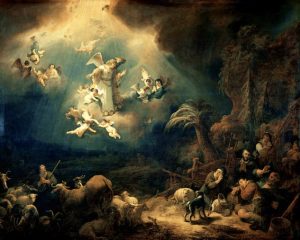..continuation of an extract from the Maria Legionis (The voice of the Legion of Mary) Edition 4 of 2018 on “Christmas” by Frank Duff. It was first published in Maria Legionis, December 1959 – February 1960.
Symbolism and Legend
The birth of Jesus is brimful of symbolism. The very name of Bethlehem is full of symbolism. It means “the House of Bread,” and its older name was “Ephrata,” which means “the House of Flesh”. Here are two overwhelmingly prophetic descriptions. Truly was Our Lord the House of Flesh in which the Divinity dwelt. Likewise you will recall that quotation in the Handbook (Legion of Mary Handbook) that Our Lord was laid in a manger because He was destined to be the Food of the World, and on straw which typified that He was the Divine Wheat, later to be made into the Eucharistic Bread.
Present with the supreme personages in the cave were members of the animal order. They were there in a representative capacity. They were the faithful ass and an ox which were sheltering there. The ass was a biblical symbol of the Israelites, the chosen people, and the ox was a biblical symbol of the Gentiles. Here you have again this meaningful pointing to the mission of Our Lord to the chosen people and then to the whole wide world.
The legends go on to say that the cave was the ruin, or part of the ruins of an old palace of King David himself, who had been born there. Imagine if this should be true: that the excluding of Jesus from Bethlehem itself should bring about His being born in the palace of King David whose great Successor He would be.
Yet, what meets the eye is degradation and rejection. Not only that, but one really could say, having regard to the defects of that habitation, that it was not a habitation at all; that He was born publicly.
Then the thought jumps to mind that He was likewise destined to die publicly. At that moment He will be even more deprived. Instead of the straw-filled manger, He will lie on the bare wood of the Cross. Instead of the rocky roof, He will have only the canopy of heaven. Instead of His Mother’s soft fingers, the cruel nails will hold Him. As He was born publicly and rejected, He would die in the same way.
Shepherds Worship The Lamb
But on neither occasion would He be absolutely rejected. There would be a faithful few around the Cross, as there were round the manger. Scripture in its beautiful accents says to us: “There were in the same country (actually it refers to the poor place called Beit-Sahur some little distance off) shepherds watching and keeping the night-watches over their flock. And behold an angel of the Lord stood by them, and the brightness of God shone round about them, and they feared with a great fear. And the angel said to them: ‘Fear not; for behold I bring you good tidings of great joy, that shall be of all people. For this day is born to you a Saviour, who is Christ the Lord, in the city of David. And this shall be a sign unto you. You shall find the Infant wrapped in swaddling clothes and laid in a manger’.
And suddenly there was with the angel a multitude of the heavenly army, praising God and saying: ‘Glory to God in the highest: and on earth peace to men of goodwill.’”
Tradition says that there were three shepherds. I wonder what proportion of the cribs give effect to that tradition? The shepherds hastened and found Mary and Joseph, and the Infant lying in the manger, and they paid homage. This was of an importance that they did not remotely glimpse. Unconsciously they were the representatives of the chosen people; and very appropriately shepherds – for the Jews had been a pastoral race throughout their earliest history. Again, the note of significant imagery is struck. Is it not shepherds who fittingly should be the first to honour the Lamb of God? The breathtaking detail of the whole thing! And there is more. We are told that the Lord came to those who were least. Into that category entered the shepherds of Judea. These were a despised and rejected caste. The courts of justice were forbidden to receive their testimony and they were placed almost on the same level as the heathen. Yet, out of all mankind, it is to those that the Babe stretches out His arms first, and it is they of all mankind who yield the first tribute of homage to Him who has been the expectation of all nations. This is a fortifying thought to us legionaries whose attention turns so instinctively towards the lesser groups in the population.
Still afar at that moment, but journeying ever nearer and nearer led by their star, were the Magi, the representatives of the Gentiles races. They too were coming to salute the new-born King, second in time to the chosen people, but discharging their role better, more worthily, nobly, and meriting for the Gentiles the higher destiny which would descend upon them later.
(to be continued)



